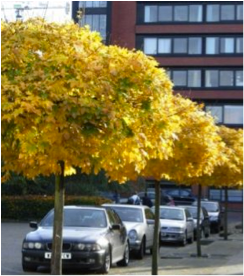Case-study /
Tree planting for urban cooling, UK

Some of the most densely built up areas in towns and cities also happen to be areas of low income or deprivation. This project recognises that the impacts of future climate (such as the urban heat island) may be more acutely felt in such areas, and has focused on urban greening to reduce these effects.
Studies by the University of Manchester have shown the benefits of urban greening in reduction of the urban heat island effect. Many areas of socio-economic deprivation have little green space or green cover.
Methods
The Green Streets Project, part of Red Rose Forest, is planting street trees in areas of socio-economic deprivation in Greater Manchester. Local communities are involved in the process from the outset, and are encouraged and supported to take on after care of planted trees. Over the last 9 years over 3,000 street trees have been planted through the Green Streets programme in the Red Rose Forests partnership area (6 of the 10 Greater Manchester Local Authority areas).
Key messages and learning outcomes
Deciduous trees planted on the south side of buildings provide shading in summer and can optimise solar gain in winter when leaves fall. Community involvement in project. Focus on priority neighbourhoods means that the unequal impacts of climate change on society are being addressed.
Adaptation outcomes
Streets with an enhanced amenity value, with trees providing shade and cooling. Community engagement means that a local sense of ownership of the trees and the wider project leads to better survival of the trees. Traditionally tree lined streets have largely been confined to more affluent areas but Green Streets has opened up this opportunity to areas of real need and residents are now beginning to understand the importance and the range of benefits that street tree planting can bring. This has brought about a real culture change with many more communities embracing green infrastructure and this is reflected in the growing waiting list for Green Streets projects.
Enabling factors
Community involvement in project. Focus on priority neighbourhoods means that the unequal impacts of climate change on society are being addressed.
Constraints
Resources – costs of trees, need for officer time, after care and replacement of trees as needed. Budget cuts in future may reverse community expectations.
Contact
Corin Bell, Green City Project Officer, Manchester City Council, 0161 234 4506
- Read about Manchester: Green City
- Read about Manchester’s City of Trees project
- Read the blog ‘Trees in hard landscapes – Getting it right in Greater Manchester‘ by Community Forest Trust (April 30, 2015)
- Read about Manchester City’s Green and blue infrastructure strategy and action plan
